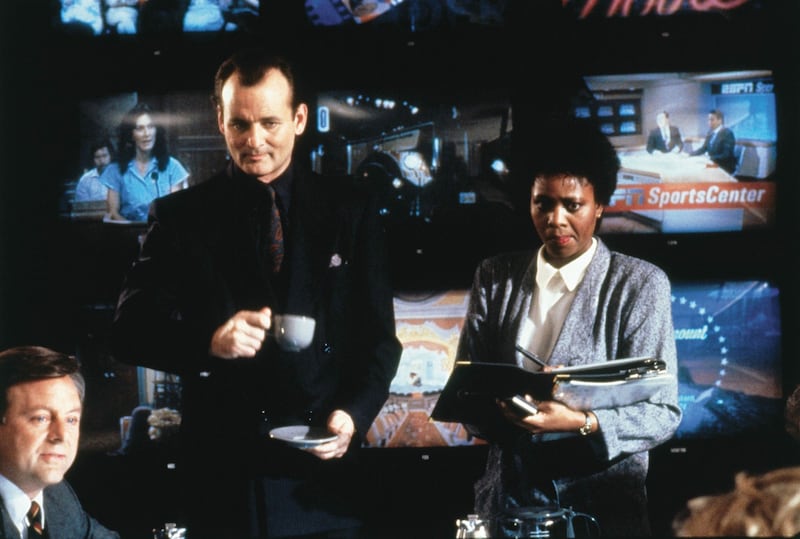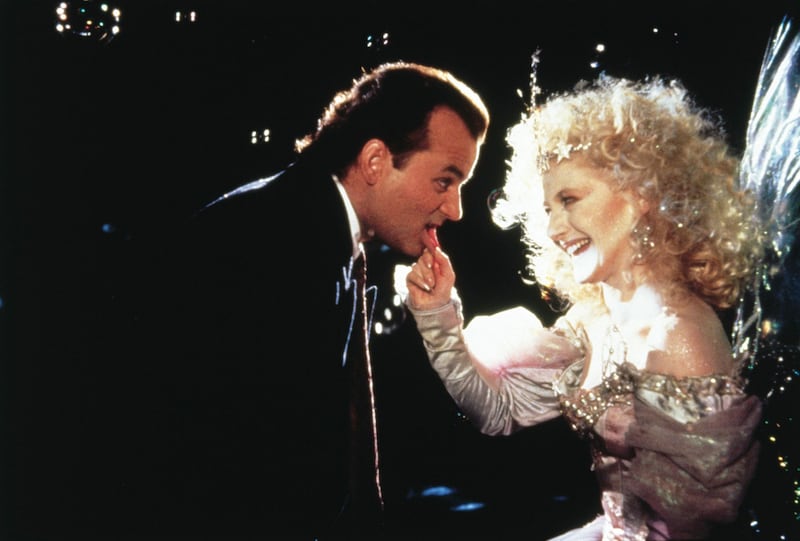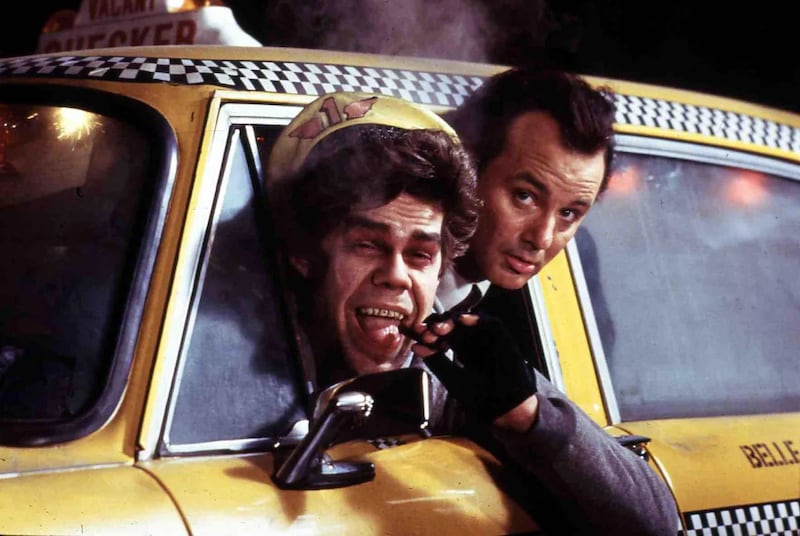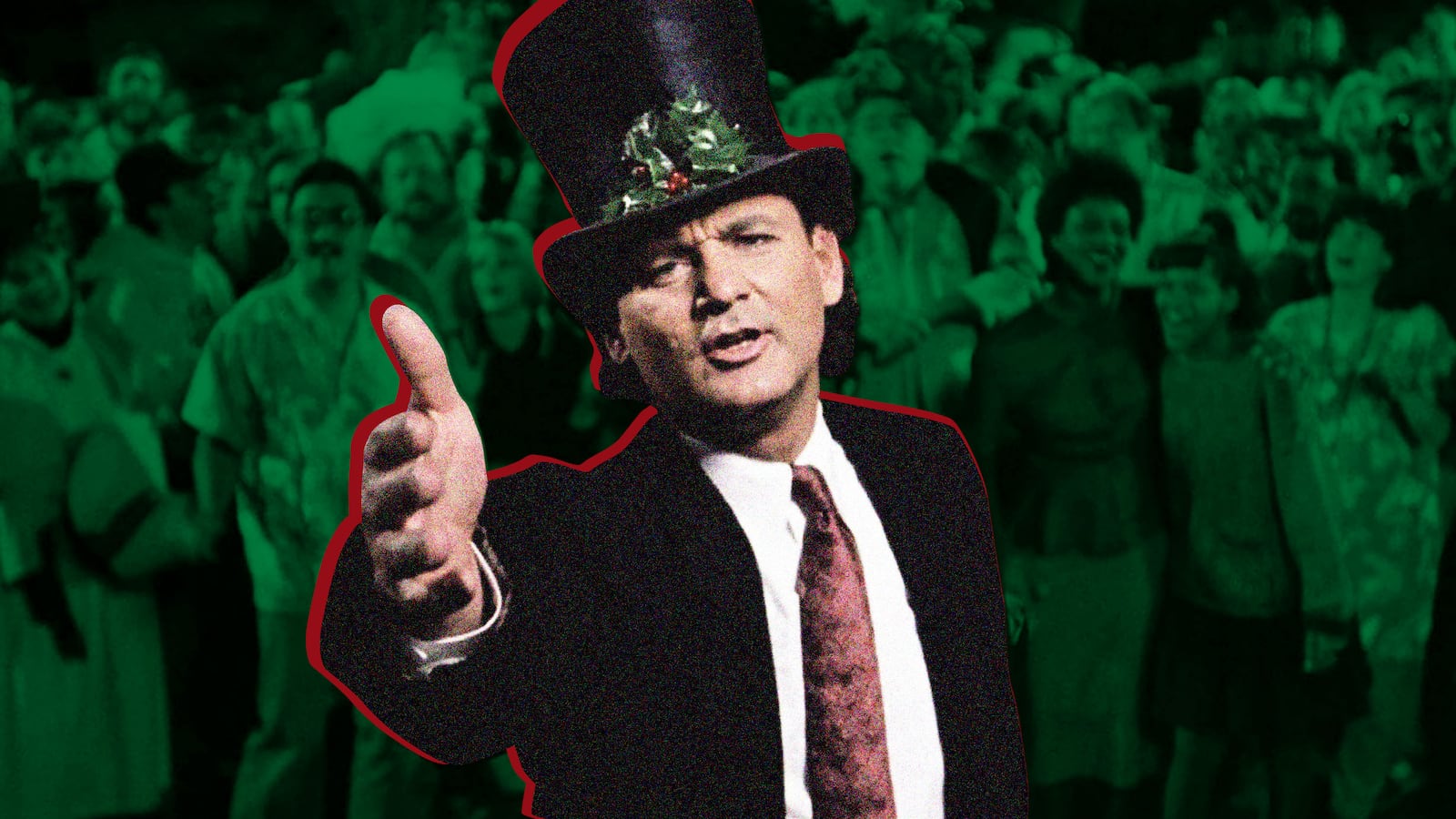A Christmas Carol has been reinvented countless times. George C. Scott has tackled it, Sir Patrick Stewart had a go, and even Kermit the Frog has tried to restore Ebenezer Scrooge’s faith in humanity—and succeeded. However, in the late 1980s, one pitch offering a fresh take on Charles Dickens’ redemption tale proved a step too far for movie studios.
“When we first turned in the script, one executive called and said, ‘He’s just so unlikable,’” laughs Mitch Glazer, co-writer of 1988’s dark festive favorite Scrooged, a film where Bill Murray plays a cynical TV boss who reluctantly learns the importance of empathy. “Michael [O’Donoghue, co-writer] and I were on a conference call and both simultaneously said, ‘Yes. He’s Scrooge. He’s really unlikable. Go back and read the book. He’s the meanest man in the world!’”
Despite being a classic literary character, Glazer and O’Donoghue’s modern-day reimagining of this iconic miser as a gruff showbiz suit unsettled those in charge. “They were horrified by the script,” reveals Glazer. “They weren’t excited by seeing a TV/film executive going through this journey. I guess it was too close to home.”
Scrooged plunged Murray back into the world of ghosts four years after the massive success of Ghostbusters. So intense was the mania surrounding 1984’s spectral comedy that it drove the former Saturday Night Live star out of Hollywood and into a self-imposed acting break—one that was only broken when Glazer and O’Donoghue’s script crossed his path.

Sticking with Dickens’ core story of a misery guts who turns his life around after a life-affirming visit from four Christmas Eve ghosts, Scrooged swapped its traditional Victorian setting for the world of ’80s corporate greed. In it, Glazer and the infamously dark-humored O’Donoghue recast Scrooge as Frank Cross, a hard-nosed, career-driven TV hack, played by Murray.
Both writers knew exactly how to harness the star’s dry, sardonic wit; O’Donoghue was Saturday Night Live’s first head writer and Glazer had worked around the show too. Guiding Cross’ journey to salvation was Superman director Dick Donner, an old-school filmmaker with a knack for larger-than-life storytelling. Together, this mixture of old and new styles aligned to create a Christmas gem—but not without generating a few sparks.
“A producer brought us the idea of adapting A Christmas Carol,” says Glazer, explaining how the project landed on his and O’Donoghue’s desk. “It was public domain, which meant he didn’t have to pay for it, something Scrooge would appreciate,” he smiles. “Michael and I were good friends and a good writing team. I remember he said, ‘If we nail this, it’ll play forever.’ I thought he was nuts—but he was completely right.”
According to Glazer, the idea of setting Dickens’ story in the broadcasting world came naturally: “It was that ‘write what you know’ thing and we both knew that world,” he tells us. “I knew the pressure and had my take on what that Scrooge boss would be like in a modern media world.”
The duo started writing in the winter and finished their Christmas tale in the height of New York summer. By the end it was a slog, but they soon discovered that the cutthroat world of showbiz provided the perfect backdrop for a seasonal scared-straight narrative.
“It was a time with the youngest executives in TV, so the idea that you could be in [Frank’s] position at Billy’s age [wasn’t unbelievable]. I think he was 37.” While Murray wasn’t yet signed on, the pair heard his iconic drawl when writing: “He didn’t know he was going to get the script, it was just easy to write hearing that kind of attack he had comically,” Glazer explains. “Frank Cross is a combination of me, Michael, and Bill.”
After Ghostbusters, Murray’s decision to return to movies was a big one—but why did he choose another ghost story? “I’m guessing the story of A Christmas Carol resonated with him,” suggests Glazer, who has since become close friends with Murray, working with him on several projects including 2015’s Rock The Kasbah and 2003’s Lost in Translation. “He comes from a large Irish Catholic family and Christmas was epic. He and I have talked about it since; they didn’t have much money. There’s a story of him buying cookies for one of his sisters as a kid and by the time he gave it to her, he’d eaten all the cookies.”

Scrooged also had the potential to act as a transitional film, suggests Glazer: “Coming after the enormity of Ghostbusters, I think he saw art and humor in Frank Cross and a power going back to Dickens.” This blend of comedy and pathos was unlike anything else Murray was being offered at the time, and foreshadowed the weightier dramas he’d go on to make later in his career. Depth was also clearly visible in Scrooged’s heavier moments, like when the Ghost of Christmas Past shows Frank his father, played by Murray’s real-life brother Brian Doyle Murray.
“He’s standing with the ghost and watching himself as a little kid,” explains Glazer. “He said that his brother used a Zippo lighter that his father used to use. His father died when Billy was very young.” When Brian flicked the lighter on, a wave of nostalgia burst into the present: “Bill said the smell of the lighter fluid brought back his dad, so there were things in the script that he could connect to dramatically. I think he was looking for something that was a bridge.”
Donner’s film ended up being a family affair for the Murray household, with two of Bill’s other brothers, Joel and John Murray, also appearing in small roles. Personal poignancy aside, Scrooged also allowed Glazer and O’Donoghue to do what they do best: poke fun at the establishment, all in the name of Christmas.
“Michael had a filing cabinet of ideas that always amused me. The Bob Goulet thing was something that, in those days, any celebrity would do,” Glazer laughs, referencing the film’s fake commercial for the brilliantly titled festive special “Bob Goulet’s Old Fashioned Cajun Christmas.” Ironically, Murray would star in a similar project himself years later, in Sofia Coppola’s 2015 seasonal one-off A Very Murray Christmas.
“‘Programming for cats’ is also pure O’Donoghue,” Glazer continues, commenting on a dumb idea suggested to Cross by his TV boss, played by Robert Mitchum. “He had cats that he swore watched TV with him, so he made the leap that some greedy executive would try to program for those feline eyeballs.” That said, one of the movie’s most ruthless gags, involving sticking fake reindeer antlers to a mouse’s head (“Have you tried staples?”), was all Glazer: “I was channeling Michael’s evil!”
Google Scrooged today, and you’ll find a slew of stories detailing a tumultuous set and alleged heated clashes between Murray and Donner. While Donner wasn’t the actor’s first choice to direct (“[Bill] really wanted Sydney Pollack,” admits Glazer), these reports are nowhere near as dramatic as their clickbait headlines suggest, the writer insists.
“I’ve been on sets that were really brutal and adversarial, and this wasn’t one of them,” he says. “This was two really big personalities at the top of their game. I think generationally and socially, they’re not two people who would’ve hung out. Whereas even though Sydney Pollack was Dick’s age, there was a different connection.”

Glazer believes any stress may have originated from a difference in creative vision but a shared desire to create the best work possible. “It was a big, expensive movie, so there’s pressure. You can feel the size of the thing but I found that clashes tended to be creative,” he adds. “Sometimes Bill, Michael, and myself had a different confidence in the comedy and Dick’s view was just a different way of seeing it. I read this stuff too about on-set battles and I don’t remember the two of them ever raising their voices at each other, not once.”
Contrary to other Scrooged stories, Glazer says there was no lasting feud between Murray and Donner (“When Dick passed, Bill sent his love to his widow through me,” reveals Glazer). Instead, he feels the pair’s contradictory styles are exactly what make this big, bold, and brash Christmas film one for the ages. “Donner brought a size to the movie that I think is part of the reason why it still resonates. It’s a huge, fast, loud ride.”
All of these elements combine in the movie’s memorable final moments, in which Frank vows to change his cruel ways during a live TV broadcast. With its loose feel and “Feed Me Seymour” quips, Frank’s monologue has a spontaneity that resonates. According to Glazer, that makes sense, as much of it came directly from Murray’s heart.
“We wanted him to say something that we believed in and it came down to the fact that as New Yorkers, the miracle was that on Christmas Eve, people were nice to you on the street,” Glazer says of writing Scrooged’s ending. However, when it came time to shoot it, Murray wasn’t convinced. “He was unsure if what we’d written would get him to the redemption moment Frank needed. I could tell he wasn’t there. He started the speech, got to the ‘for one night, we’re the people we hope to be’ ending, and just kept going. Everything from that moment on is him.”
Like a Christmas miracle, that chaotic mixture of styles suddenly gelled, with Donner “pulling the camera operator by the collar” and capturing Murray’s single impromptu take in real time. “In my memory of it, it was quiet afterwards,” Glazer recalls. “Dick loved it; it was from the heart and had size to it. He was really moved. When they finally cut, they might have hugged. It was that kind of moment.
“It was Frank Cross trying to save us all—and himself. It still has power.”






